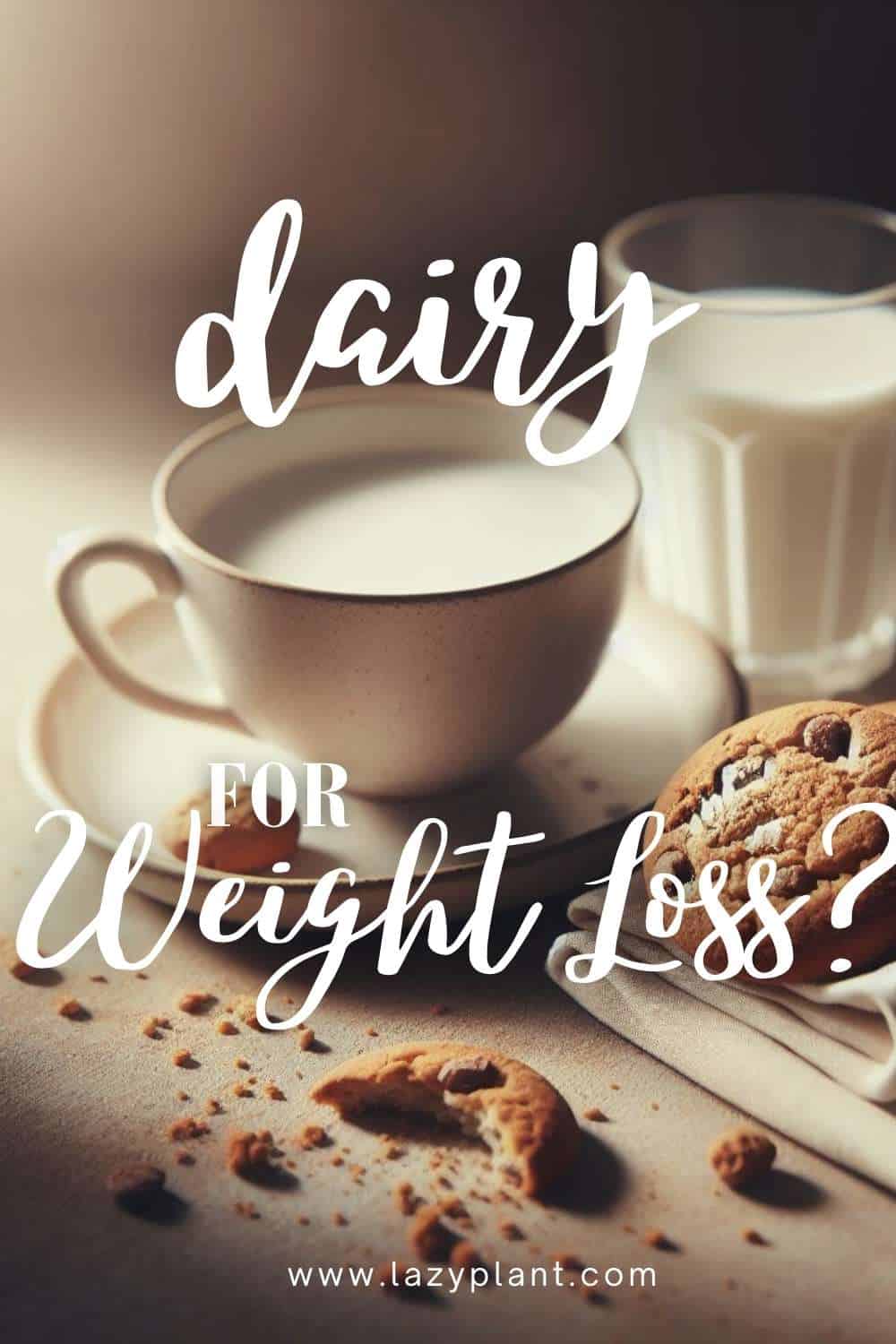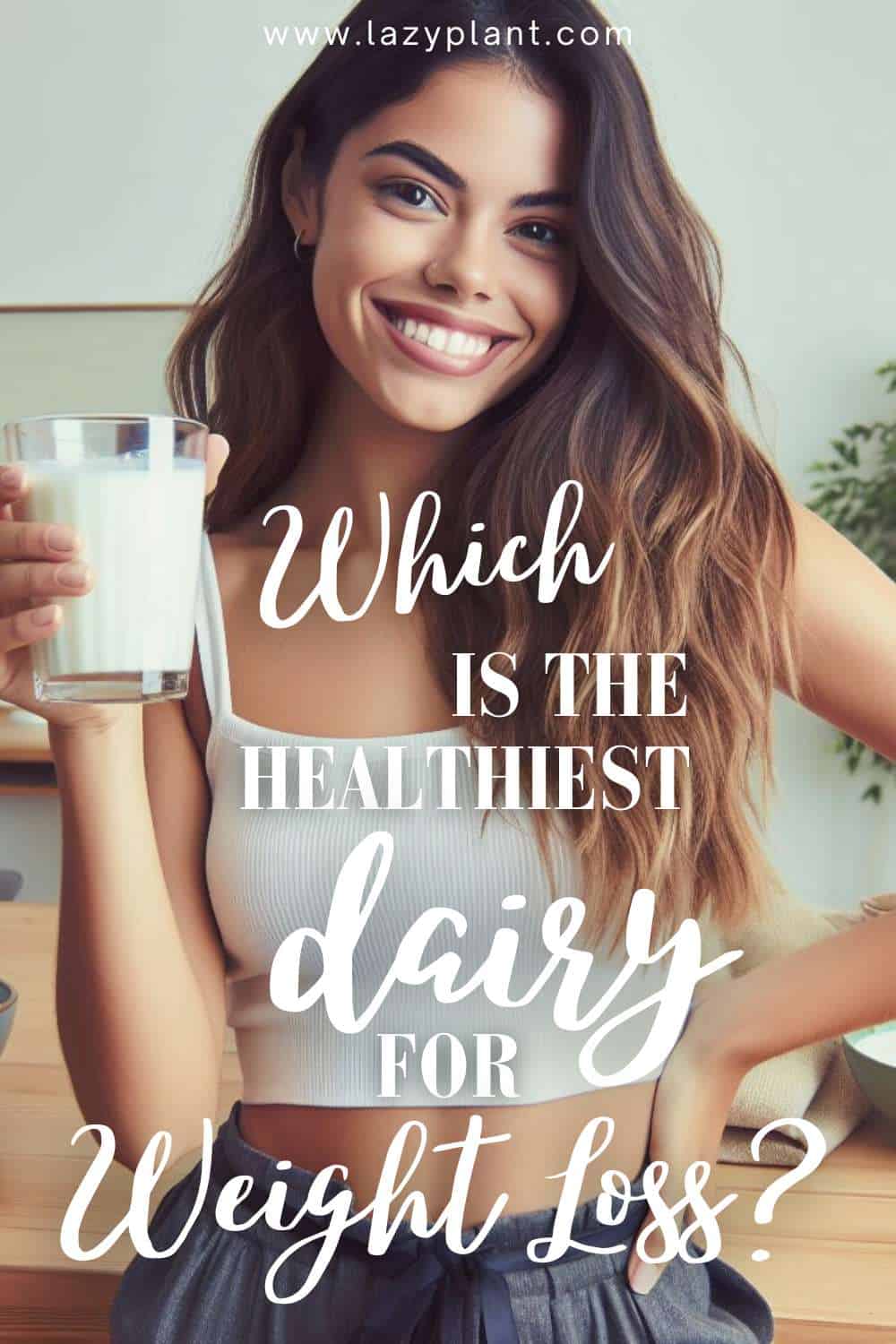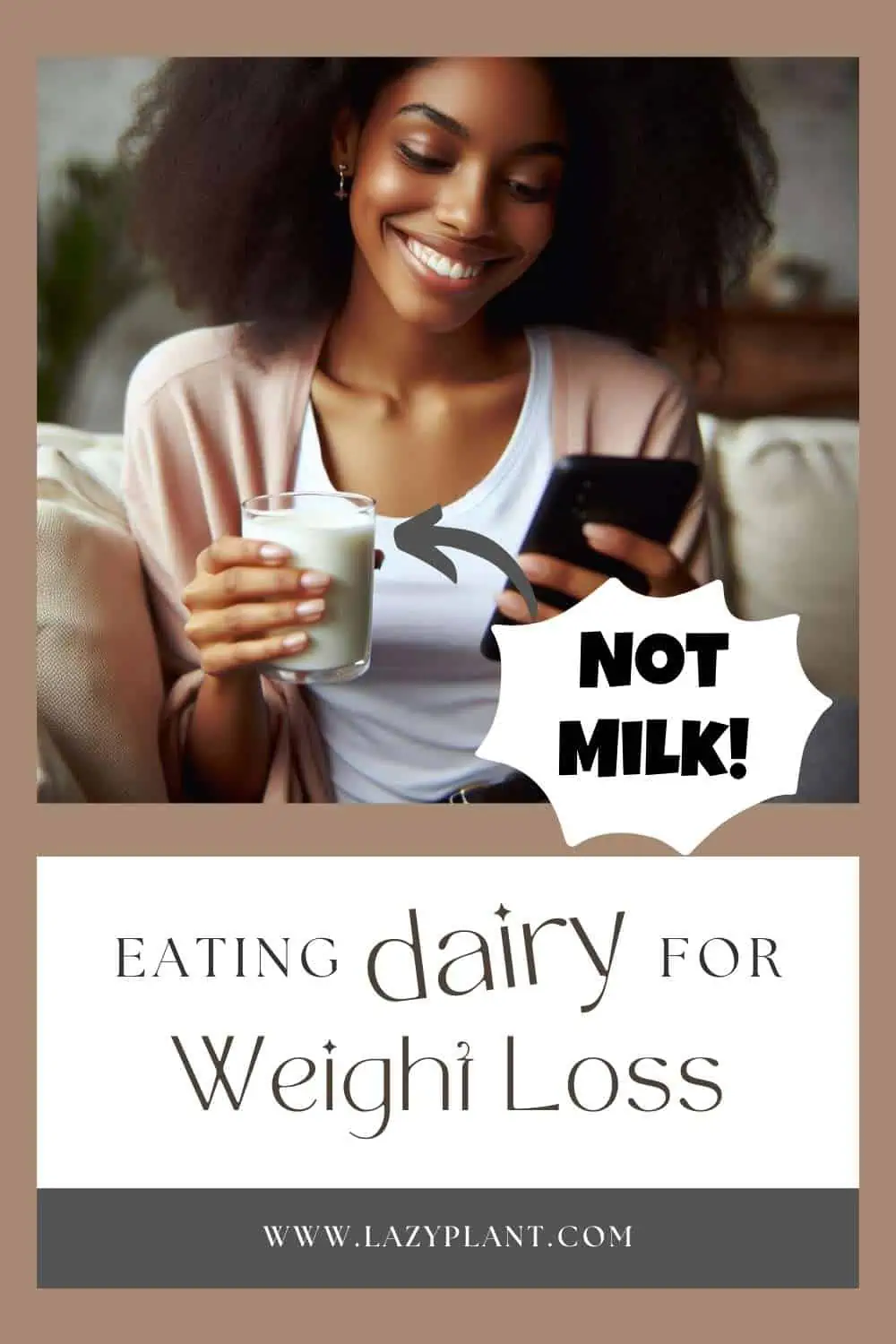The healthiest dairy product that enhances weight loss is kefir, as it’s the richest food in probiotics, which support healthy gut microbiota. This is key for a lean body, as many hormones that regulate appetite and reduce cravings for fattening foods are produced in the gut. Moreover, kefir is rich in protein and vitamins that stimulate belly fat burning, while having reasonable amounts of sodium and saturated fat.
Certainly, consuming 2% Greek yogurt, cottage cheese, or skim milk, instead of their full-fat alternatives could play a huge role in calorie intake and health.
How many calories are in dairy?
Whole milk has approximately 60 calories, while reduced fat (0-2%) milk has 30–50 calories per 100g. A cup of whole milk has about 150 calories. A cup of skim milk has between 80 and 120 calories.[1,2]
Hence, drinking 1–2 servings of any dairy product a day, as part of a healthy, well-balanced, hypocaloric diet won’t make you fat.
| Food | Serving Size | Calories per Serving | Calories per 100 g |
|---|---|---|---|
| Skim Milk | 1 cup | 83 | 34 |
| Full Fat Milk | 1 cup | 149 | 61 |
| Greek Yogurt | 1 cup | 130 | 59 |
| Kefir | 1 cup | 139 | 41 |
| cottage cheese 2% | 1/2 cup | 104 | 84 |
| Cheddar Cheese | 1 oz | 114 | 403 |
| Swiss Cheese | 1 oz | 106 | 380 |
| Mozzarella Cheese | 1 oz | 71 | 254 |
| Feta Cheese | 1 oz | 75 | 264 |
| Parmesan Cheese | 1 oz | 122 | 431 |
| heavy cream | 1 tbsp | 51 | 340 |
| Butter | 1 tbsp | 102 | 717 |
Certainly, you have to consume full-fat milk, cheese, butter, ice cream, and heavy cream in moderation if you want to lose weight.
It’s easy to overconsume dairy products. Actually, most people who follow the standard Western diet consume significantly higher amounts than the recommended portion size. Eating 4–5 servings a day can ruin your weight loss efforts. You should be very mindful of portion sizes.
Cheese, heavy cream, and butter are calorie-dense foods. Better to avoid consuming them while dieting, or at least eat small amounts a couple of times per week.
Saturated fat in milk may lead to obesity
Above all, we should consume milk and dairy in moderation because they’re pretty high in saturated fat. Actually, about half of the calories of whole milk come from fat.
According to the Dietary Guidelines for Americans, we shouldn’t get more than 35% of calories from fat.[3]
Most noteworthy, the American Heart Association recommends eating no more than 13 grams of saturated fat a day. High saturated fat intake increases cholesterol in the blood, causing an increased risk of heart disease and stroke! Also, consuming high amounts of saturated fat has been associated with obesity.[4,5]
Actually, a cup of full-fat milk may have up to 5.2 grams of saturated fat, which is 40% of the maximum safe intake on a 2,000-calorie diet. Hence, you should be very cautious with your food choices.
| Food | Serving Size | Fat per Serving | Fat per 100 g | Saturated Fat per % of Total Fat | Saturated Fat per 100 g | Saturated Fat per Serving |
|---|---|---|---|---|---|---|
| Skim Milk | 1 cup | 0.2 g | 0.1 g | 63% | 0.1 g | 0.1 g |
| Full Fat Milk | 1 cup | 7.9 g | 3.3 g | 63% | 2.1 g | 5.2 g |
| Greek Yogurt | 1 cup | 10.6 g | 4.8 g | 63% | 3.0 g | 8.5 g |
| Kefir | 1 cup | 8 g | 3.2 g | 63% | 2 g | 5 g |
| cottage cheese, 2% | 1/2 cup | 2.9 g | 2.3 g | 66% | 1.5 g | 1.9 g |
| Cheddar Cheese | 1 oz | 9.3 g | 33.1 g | 65% | 21.4 g | 2.7 g |
| Swiss Cheese | 1 oz | 7.9 g | 28.4 g | 64% | 18.1 g | 2.2 g |
| Mozzarella Cheese | 1 oz | 5.8 g | 20.6 g | 65% | 13.3 g | 1.5 g |
| Feta Cheese | 1 oz | 6.0 g | 21.2 g | 65% | 13.7 g | 1.8 g |
| Parmesan Cheese | 1 oz | 7.9 g | 27.8 g | 64% | 17.6 g | 2.2 g |
| heavy cream | 1 tbsp | 5.3 g | 35 g | 63% | 22 g | 3.3 g |
| Butter | 1 tbsp | 11.5 g | 81.1 g | 64% | 51.6 g | 7.4 g |
If you like dairy, at least minimize the consumption of other animal-based foods, as they’re the main sources of saturated fat, along with coconut and palm oil.
On the other hand, vegetables, fruits, and beans don’t contain any saturated fat. It’s a good idea to eat dairy products with plant-based foods.
Skim milk and 2% cottage cheese are the two healthiest dairy products for weight loss, as they have the lowest saturated fat concentrations among dairy products. A serving provides 0% and 15% of the maximum safe daily intake, respectively.
Other low-fat dairy products, like kefir and Greek yogurt, are also pretty low in saturated fat. You could consume them to build a lean body. A serving may provide less than 1 gram of saturated fat.
Keep in mind that a cup of skim milk contains almost no fat while a cup of 2% milk has about 2.8 grams of saturated fat, which is 21% of the maximum safe daily intake!
High Protein intake enhances Weight Loss
Furthermore, low-fat dairy products are excellent dietary sources of protein. Protein is good for weight loss because it:
- maintains lean body mass during dieting
- has the highest thermic effect. We burn 20-30% of calories of protein during digestion
- regulates appetite
The richest dairy in protein is low-fat Greek yogurt. It provides up to 23 grams per serving! Cottage cheese with almost 14 grams and kefir with 11 grams of protein per serving also help you build a lean body.
| Food | Serving Size | Protein per Serving | Protein per 100 g |
|---|---|---|---|
| Skim Milk | 1 cup | 8 g | 3.4 g |
| Full Fat Milk | 1 cup | 8 g | 3.2 g |
| Greek Yogurt | 1 cup | 23 g | 9 g |
| Kefir | 1 cup | 11 g | 4 g |
| cottage cheese | 1/2 cup | 13.6 g | 11 g |
| Cheddar Cheese | 1 oz | 7 g | 25 g |
| Swiss Cheese | 1 oz | 8 g | 28 g |
| Mozzarella Cheese | 1 oz | 6 g | 22 g |
| Feta Cheese | 1 oz | 4 g | 14 g |
| Parmesan Cheese | 1 oz | 10 g | 35 g |
| heavy cream | 1 tbsp | 0.3 g | 2.1 g |
| Butter | 1 tbsp | 0 g | 0 g |
Can sugar in milk cause belly fat?
Milk naturally contains sugars. A cup of milk has about 12 grams of sugars, which are absorbed really fast, causing insulin spikes. Hence, drinking high amounts of milk may cause increased insulin secretion and insulin resistance.[6,7]
Insulin resistance is highly associated with obesity.[8]
| Food | Serving Size | Sugar per Serving | Sugar per 100 g |
|---|---|---|---|
| Skim Milk | 1 cup | 12 g | 4.9 g |
| Full Fat Milk | 1 cup | 12 g | 4.8 g |
| Greek Yogurt | 1 cup | 9 g | 5.1 g |
| Kefir | 1 cup | 12 g | 4.7 g |
| Cheddar Cheese | 1 oz | 0.2 g | 0.7 g |
| Swiss Cheese | 1 oz | 0.4 g | 1.4 g |
| Mozzarella Cheese | 1 oz | 0.6 g | 2.2 g |
| Feta Cheese | 1 oz | 0.2 g | 0.7 g |
| Parmesan Cheese | 1 oz | 0.2 g | 0.7 g |
| Butter | 1 tbsp | 0.1 g | 0.1 g |
Thus, eating milk with other sugar-rich foods will flood the bloodstream with sugar that the body should try to quickly remove, spiking insulin levels. This process causes cravings, leading to overeating.
That’s why it’s a bad idea to consume milk with cereals with added sugar. Prefer oatmeal or any other whole-grain cereal instead.
Hormones in milk are bad for weight loss!
Most noteworthy, milk is rich in hormones. For instance, just a cup of milk can increase the insulin-like growth factor 1 (IGF-1) hormone concentrations. High levels of IGF-1 hormone may cause obesity.[9,10]
Additionally, high IGF-1 concentrations have been associated with higher cancer risk, particularly prostate, breast and colorectal cancer.[11]
Thus, limiting the consumption of milk and other dairy products seems to be a good idea.

You could limit the negative effects of high IGF-1 concentrations by consuming fermented dairy products, though.
Yogurt and other fermented milk products provide favorable health outcomes beyond the milk from which these products are made. In fact, researchers advise that consumption of these products should be encouraged as part of national dietary guidelines.[12]
IGF-I concentrations are significantly decreased by the fermentation process. Lactic acid bacteria are capable of utilizing IGF-I as their nutrition source.[13]
The healthiest fermented product is kefir, though.
Kefir & Greek yogurt are rich in Probiotics
Both kefir and Greek yogurt are fermented foods that contain probiotics.
Kefir is a probiotic drink made from a mix of 4-15 strains of bacteria and yeast and is approximately 2-3 billion cfu per gram. Greek yogurt is a single strain, while certain brands contain up to 7 strains and approximately 1-2 billion cfu per gram.
Hence, kefir contains more strains of bacteria and yeasts than Greek yogurt. It has a higher concentration of probiotics.
However, the exact amount of probiotics in kefir and Greek yogurt can vary depending on the brand and type. It’s important to check the labels for the number of strains and cultures to ensure you’re getting the desired amount of probiotics.
What’s the healthiest dairy product for Weight Loss?
Kefir for Gut Health
Kefir is the healthiest dairy product you could consume for weight loss. Especially 2% kefir is low in calories and saturated fat, while it’s the richest common food in probiotics, which play a significant role in gut health!
There is a connection between gut health and weight loss. Gut hormones play a critical role in regulating our metabolism and appetite.
Some of these hormones directly affect our eating behavior: Cholecystokinin, peptide YY, pancreatic polypeptide, glucagon-like peptide-1, and oxyntomodulin suppress your appetite, whereas ghrelin makes you more hungry.
According to a 2021 study published in the American Society for Microbiology (ASM)’s journal mSystems, the good bacteria in our gut have a direct impact on our ability to lose weight. The study found that people who lost weight had a higher abundance of certain bacteria in their gut microbiome than those who didn’t lose weight. The researchers also found that the gut microbiome of people who lost weight was more diverse than that of people who didn’t lose weight.[14]
Cottage cheese & Greek yogurt
You could also eat low-fat cottage cheese and Greek yogurt for weight loss. They’re rich in protein while having a few calories. Greek yogurt is a good source of probiotics as well.
How to eat them for a Lean body?
The best way to eat kefir, cottage cheese, and Greek yogurt for weight loss is with foods rich in fiber. The combination of fiber with protein substantially increases satiety.
Moreover, both probiotics and fiber are necessary for gut health.
Hence, you could add kefir to your smoothies or oatmeal.
Also, you could enjoy cottage cheese with whole-grain crackers, salads, or countless recipes.
Greek yogurt with berries, bananas, seeds, nuts, or granola can be a super-filling snack that helps build muscle mass.
The role of Calcium in Weight Loss
Calcium is beneficial for keeping a normal body weight. It helps the body burn fat for energy and prevents fat absorption.
A serving of your favorite dairy products can provide 20-30% of the daily value!
| Food | Serving Size | Calcium per Serving | Calcium per 100 g | % DV per Serving |
|---|---|---|---|---|
| Skim Milk | 1 cup | 300 mg | 122 mg | 23% |
| Full Fat Milk | 1 cup | 276 mg | 113 mg | 28% |
| Greek Yogurt | 1 cup | 200 mg | 113 mg | 20% |
| Kefir | 1 cup | 300 mg | 117 mg | 23% |
| Cheddar Cheese | 1 oz | 204 mg | 721 mg | 20% |
| Swiss Cheese | 1 oz | 224 mg | 798 mg | 22% |
| Mozzarella Cheese | 1 oz | 207 mg | 736 mg | 21% |
| Feta Cheese | 1 oz | 140 mg | 496 mg | 14% |
| Parmesan Cheese | 1 oz | 331 mg | 1174 mg | 33% |
| Butter | 1 tbsp | 1 mg | 3 mg | 0% |
Milk isn’t the only good source of calcium, though. Actually, there are many plant-based foods high in calcium.
The role of Vitamin B12 in Weight Loss
Some studies suggest that vitamin B12 could affect body fat and metabolism. Deficiency has been linked to increased fat accumulation and obesity.
Interestingly, several studies have found that having adequate vitamin B12 levels may be associated with a lower risk of weight gain and obesity.

According to one large study of 9,075 people, having higher blood levels of vitamin B12 was associated with a lower risk of obesity.[15]
While vitamin B12 isn’t a magic compound for weight loss, it’s important to ensure that you’re getting enough of this essential nutrient.
All dairy products are excellent natural sources of vitamin B12.
| Food | Vitamin B12 per Serving | % DV per Serving |
|---|---|---|
| Skim Milk | 1.23 mcg | 20.5% |
| Full Fat Milk | 1.10 mcg | 18.3% |
| Greek Yogurt | 1.40 mcg | 23.3% |
| Kefir | 1.42 mcg | 23.7% |
| Cheddar Cheese | 0.24 mcg | 10% |
| Swiss Cheese | 0.95 mcg | 39.5% |
| Mozzarella Cheese | 0.27 mcg | 11.3% |
| Feta Cheese | 0.50 mcg | 20.8% |
| Parmesan Cheese | 0.31 mcg | 13% |
| Butter | 0.01 mcg | 0.1% |
Vitamin B12 is present in animal products. Plant-based foods are poor sources.
Hence, vegetarians may benefit from supplementing with this crucial water-soluble vitamin. Even high dosages are considered pretty safe.
You need Vitamin D to burn belly fat
Vitamin D is a fat-soluble vitamin that plays an important role in many aspects of health. Vitamin D plays a key role in fat metabolism. A deficiency could be linked to increased fat accumulation and obesity.
It’s important to ensure that you’re getting enough of this essential nutrient. Vitamin D is found naturally in only a few animal products. Plant-based foods are poor sources.
How much Vitamin D is in Dairy products?
Vitamin D is not naturally present in milk or yogurt. However, some manufacturers fortify their milk products with vitamin D to increase their nutritional value.
Vitamin D is added to milk and other dairy products because it helps the body absorb calcium, which is essential for strong bones
| Food Type | Vitamin D (per serving) | Vitamin D (% DV per serving) |
|---|---|---|
| Skim Milk | 115 IU | 29% |
| 2% Milk | 115 IU | 29% |
| Full-Fat Milk | 115 IU | 29% |
| Kefir | 40 IU | 10% |
| Cottage Cheese | 0 IU | 0% |
| Butter | 0 IU | 0% |
| 2% Greek Yogurt | 0 IU | 0% |
Actually, only certain types of cheese contain naturally some vitamin D. However, we can’t depend on them to meet our daily needs.
How to boost vitamin D intake?
We can get high amounts of vitamin D by consuming a tbsp of cod liver oil. Just a tbsp provides 1,360 IU (34 mcg) of vitamin D! More than the recommended daily intake (600 IU).
Beef liver, eggs, and certain mushrooms exposed to UV light contain decent amounts of vitamin D as well.
Furthermore, our bodies synthesize vitamin D when the skin is exposed to sunlight. We shouldn’t depend on sun exposure for vitamin D, though. Sun irradiation is dangerous.

As it’s rather tricky to get adequate amounts of vitamin D from diet or sun exposure, many people would benefit from taking a vitamin D supplement. You’ll find a variety of vitamin D supplements on iHerb.
Vitamin D is a fat-soluble vitamin. Fat increases its absorption.
Always check your serum vitamin D concentration before taking a dietary supplement.
Don’t eat Cheese due to Sodium
The American Heart Association recommends no more than 2,300 mg of sodium a day. Even lower doses of 1,500 mg are healthier.[16]
The average American eats so much excess sodium. On average, we eat more than 3,400 milligrams of sodium each day. Cutting it back can significantly improve blood pressure and heart health.
Effects on Weight Loss
Moreover, high sodium intake could lead to water retention and short-term weight gain. It might indirectly play a role in obesity, as salt may affect satiety signaling to the brain. High amounts of salt could interfere with the body’s natural hunger and fullness cues.
High salt intake could lead to a blunted response to satiety signals in the brain, which could contribute to overeating and weight gain.[17]
Cheeses are packed with Sodium
As you can see in the table below, most types of cheese contain high amounts of sodium. So, you should avoid consuming them for better health and weight loss. Especially, Parmesan cheese, American cheese, and feta cheese, as they’re packed with sodium as well as saturated fat and calories.
| Food Type | Sodium (per serving) | Sodium (% DV per serving) |
|---|---|---|
| Skim Milk | 107 mg | 5% |
| Full-Fat Milk | 120 mg | 5% |
| Kefir | 91 mg | 4% |
| Cottage Cheese | 321 mg | 14% |
| Butter | 82 mg | 3% |
| 0% Greek Yogurt | 50 mg | 2% |
| 2% Greek Yogurt | 50 mg | 2% |
| American Cheese | 406 mg | 18% |
| Blue Cheese | 393 mg | 16% |
| Cheddar Cheese | 174 mg | 7% |
| Feta Cheese | 316 mg | 13% |
| Mozzarella Cheese | 178 mg | 7% |
| Parmesan Cheese | 454 mg | 19% |
Are plant-based foods healthier?
The debate between animal dairy products and plant-based alternatives is ongoing. While animal dairy products are a good source of calcium and protein, they can also be high in saturated fat and cholesterol.
Plant-based alternatives, on the other hand, are often lower in calories and saturated fat and can be a good source of vitamins and minerals.
According to a recent study, overweight adults who replaced animal products with plant-based foods experienced significant weight loss and improved health.[18]

Another study found that people who consumed more plant-based foods had a lower risk of developing heart disease and other chronic conditions.[19]
In summary, both animal dairy products and plant-based alternatives can be part of a healthy diet. It’s important to choose products that are low in saturated fat and added sugars and high in vitamins and minerals.
Making small diet changes
If you’re looking to lose weight, replacing animal products with plant-based foods could be a good place to start. But, following a healthy, well-balanced diet may be more important.
Even small changes can play a significant role in your weight loss journey and above all in good health. Practically, you could make these changes:
| Healthy Alternative | Benefits | |
|---|---|---|
| full-fat milk | skim or 2% milk | fewer calories, less saturated fat |
| cheddar cheese | cottage cheese | fewer calories, less saturated fat, more protein, more volume per serving |
| full-fat yogurt | 2% Greek yogurt | more protein, satiety effect |
| milk | kefir | supports Gut health, easily digested |
Please note that the nutritional values shown in the tables may vary depending on the brand and type of food. The % DV is based on a 2,000-calorie diet and may vary depending on your daily calorie intake